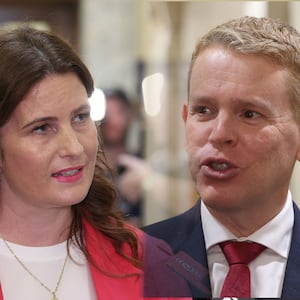Politics
New Zealand’s Finance Minister Challenges Opposition on Fiscal Responsibility

Finance Minister Nicola Willis initiated a strong critique of the opposition’s fiscal policies on October 3, 2023, as she accused Labour leader Chris Hipkins and Green co-leader Chloë Swarbrick of engaging in what she termed “fiscal vandalism.” This confrontation came shortly after Willis announced that the Government had maintained its AA+ credit rating, affirmed by Fitch Ratings, despite ongoing challenges to the public finances.
Willis issued a press release highlighting the significance of the credit rating, which she indicated was crucial for New Zealand’s borrowing capabilities. She noted that the country’s historical reputation for responsible fiscal management has allowed it to borrow at reasonable rates. “Historically, New Zealand governments have been able to borrow at reasonable rates because of their reputation for being responsible managers of public money, but that is not something that should be taken for granted,” she stated.
The Finance Minister used Fitch’s assessment as a platform to launch a broader critique of the Labour Party and the opposition. She referenced the agency’s warning that a “weakening in the culture of fiscal commitment to fiscal responsibility would affect creditworthiness.” This comment, according to Willis, underscores the potential risks associated with the opposition’s fiscal plans.
In response, Hipkins defended his party’s approach, emphasizing the necessity of investing in social services and infrastructure. He argued that fiscal responsibility is not only about maintaining credit ratings but also about ensuring that the needs of New Zealanders are met. “Our government prioritizes the well-being of our citizens while also being mindful of our financial obligations,” Hipkins responded, highlighting a commitment to balancing economic stability with social investment.
Swarbrick added to the discourse, arguing that the Green Party’s fiscal policies align with sustainable investment and long-term growth, rather than short-term credit ratings. “We believe in a future where fiscal responsibility includes ecological and social considerations,” she remarked, emphasizing the need for a holistic approach to governance.
As the debate continues, the implications of these fiscal strategies are significant. With rising inflation and economic uncertainty, the Government’s ability to maintain its credit rating could impact its financial decisions moving forward. Analysts note that the political landscape surrounding fiscal policy is more contentious than ever, and the upcoming elections could further influence these discussions.
The ongoing discourse between the current government and the opposition highlights the divergent views on fiscal management in New Zealand. As the political battle unfolds, the stakes remain high for both parties in their efforts to appeal to voters while navigating the challenges of maintaining fiscal responsibility amidst economic pressures.
-

 World3 months ago
World3 months agoTest Your Knowledge: Take the Herald’s Afternoon Quiz Today
-

 Sports3 months ago
Sports3 months agoPM Faces Backlash from Fans During Netball Trophy Ceremony
-

 Lifestyle3 months ago
Lifestyle3 months agoDunedin Designers Win Top Award at Hokonui Fashion Event
-

 Sports3 months ago
Sports3 months agoLiam Lawson Launches New Era for Racing Bulls with Strong Start
-

 Lifestyle3 months ago
Lifestyle3 months agoDisney Fan Reveals Dress Code Tips for Park Visitors
-

 Health3 months ago
Health3 months agoWalking Faster Offers Major Health Benefits for Older Adults
-

 World3 months ago
World3 months agoCoalition Forms to Preserve Māori Wards in Hawke’s Bay
-

 Politics3 months ago
Politics3 months agoScots Rally with Humor and Music to Protest Trump’s Visit
-

 Top Stories3 months ago
Top Stories3 months agoUK and India Finalize Trade Deal to Boost Economic Ties
-

 Entertainment3 months ago
Entertainment3 months agoExperience the Excitement of ‘Chief of War’ in Oʻahu
-

 World3 months ago
World3 months agoHuntly Begins Water Pipe Flushing to Resolve Brown Water Issue
-

 Science3 months ago
Science3 months agoNew Interactive Map Reveals Wairarapa Valley’s Geological Secrets









